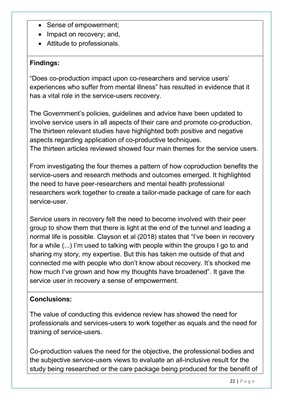
22 | P a g e
• Sense of empowerment;
• Impact on recovery; and,
• Attitude to professionals.
Findings:
"Does co-production impact upon co-researchers and service users'
experiences who suffer from mental illness" has resulted in evidence that it
has a vital role in the service-users recovery.
The Government's policies, guidelines and advice have been updated to
involve service users in all aspects of their care and promote co-production.
The thirteen relevant studies have highlighted both positive and negative
aspects regarding application of co-productive techniques.
The thirteen articles reviewed showed four main themes for the service users.
From investigating the four themes a pattern of how coproduction benefits the
service-users and research methods and outcomes emerged. It highlighted
the need to have peer-researchers and mental health professional
researchers work together to create a tailor-made package of care for each
service-user.
Service users in recovery felt the need to become involved with their peer
group to show them that there is light at the end of the tunnel and leading a
normal life is possible. Clayson et al (2018) states that "I've been in recovery
for a while (...) I'm used to talking with people within the groups I go to and
sharing my story, my expertise. But this has taken me outside of that and
connected me with people who don't know about recovery. It's shocked me
how much I've grown and how my thoughts have broadened". It gave the
service user in recovery a sense of empowerment.
Conclusions:
The value of conducting this evidence review has showed the need for
professionals and services-users to work together as equals and the need for
training of service-users.
Co-production values the need for the objective, the professional bodies and
the subjective service-users views to evaluate an all-inclusive result for the
study being researched or the care package being produced for the benefit of